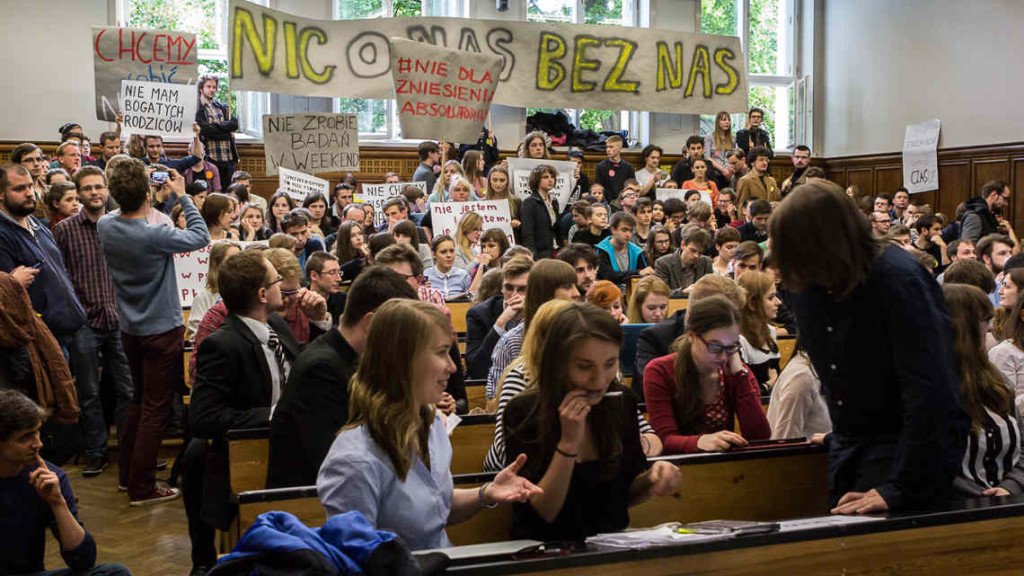The student protests of the past days at the University of Warsaw are not an isolated event; they join a larger wave of international student actions that are resisting the commercialization of education.
The slogan of the Polish students, ‘University is not a business’, resonates with the demands of their colleagues abroad.
2015 is not even half-way through, and already the year has seen a number of significant student protests in the Netherlands, Quebec, the United Kingdom, Macedonia, Chile, and Denmark, among others. Recent events at the University of Warsaw, sparked by the introduction of new Regulations of Study, thus join a larger movement which interrogates the nature and purpose of higher education in an era of increased commercial pressures on public services. Protestors have articulated different demands relevant to their local conditions in each country, but what unites these movements is a rejection of the commodification of education. The slogan of the Polish students, ‘University is not a business’, thus resonates with the demands of their colleagues abroad.
Earlier this year in Quebec, thousands of students went on strike over cuts to education in the Canadian province, thus echoing the mass student protests of the ‘Maple Spring’ of 2012, which had been aimed against the increase in university tuition fees. High tuition fees, the ongoing marketization of higher education, and austerity measures have also been the focus of ongoing protests in the UK, which resulted in the occupation of several universities in London and elsewhere in the country throughout recent months. In Amsterdam, students opposed cuts that targeted the humanities in particular. These protests were thus united in their rejection of austerity as a viable framework for the future development of higher education.
What these protests further share is the fear that the autonomy of higher education is at risk, whether through ongoing pressures on universities to drive for financial profit rather than providing a space for free and open thought, or through increased government control of universities regardless of the wishes of students themselves, as in the case of Macedonia. That the student voice is not being heard in Parliament is also one of the major concerns of students in Warsaw. In Chile, sustained pressure on the government over a number of years has finally resulted in the introduction of free higher education. Elsewhere, gains have been more modest, though not without success altogether. At the London School of Economics, for instance, university management made a number of concessions to student demands as a result of their occupation in April.
That the student voice is not being heard in Parliament is one of the major concerns of students in Warsaw.
The decisions of students to rally have developed independently of one another in various countries as a response to local issues. Yet a certain level of communication and solidarity is apparent in the adoption of the red square as a symbol for student protests; first donned by students in Quebec in 2005, the small squares of red felt were also worn by students in Amsterdam earlier this year and at the occupations of British universities. The #redsquareeverywhere campaign is encouraging people internationally to show their support for the idea of open and free education by painting a red square in public spaces.
Whether or not Polish students choose to appropriate this symbol as well, they can be sure that many of their peers in other countries share similar concerns about the direction in which their universities are heading with an equal degree of urgency. Only yesterday, students went into occupation at the University of Manchester as a reaction to the prospect of five more years of austerity and funding cuts with the newly-elected conservative government in Britain. The language of their demands has been remarkably similar to their Polish counterparts: ‘We are occupying to begin to create a space where we are more than customers, and education is more than a business’. Polish students, you are not alone.
![Political Critique [DISCONTINUED]](http://politicalcritique.org/wp-content/uploads/2015/09/Political-Critique-LOGO.png)
![Political Critique [DISCONTINUED]](http://politicalcritique.org/wp-content/uploads/2015/09/Political-Critique-LOGO-2.png)
